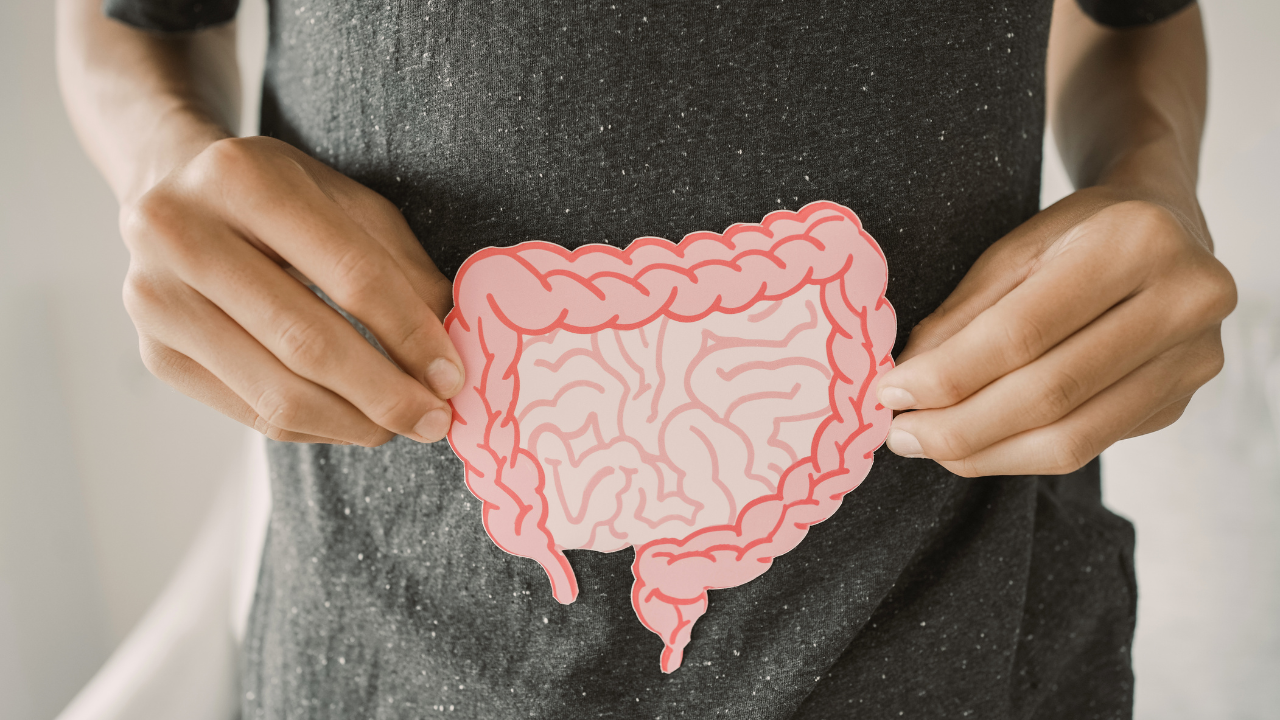IBS and Weight: Exploring the Intricate Link and Practical Solutions
Ever wondered if Irritable Bowel Syndrome (IBS) could be behind those pounds that just don’t seem to come off, no matter what you do? It's a common query that's crossed my path countless times. And you're not alone; many of my clients struggle with managing both IBS and their weight. But fear not, because we're about to do a deep dive into this intricate link!
As a Registered Dietitian (RD) advocating for a weight-neutral approach to health and wellness, I often encounter clients grappling with the dual challenge of managing IBS and fluctuations in their weight. Our bodies are complex and respond to a variety of influences, some interconnected, others quite surprising.
Join me today as we delve into the complex relationship between Irritable Bowel Syndrome (IBS) and weight, uncovering the science, sifting through misconceptions, and exploring strategies to foster a healthier, happier gut and supporting metabolism without fixating on the numbers on the scale.
Weight Neutral Coaching
As an RD and coach, I take a weight-neutral approach in my practice. While weight changes may give us some indication of what’s going on in your body, body weight is not a good indicator of health status and so I encourage you to focus on being the healthiest version of yourself, without focusing on the scale number.
You may also want to read: What Science Says: Why Weight Isn’t a Reliable Indicator of Health Status (Part 1).
This being said, there are some ways that IBS and the associated issues can cause changes in our weight, so let's understand the science behind this.
What Affects Our Weight?
Our body weight is influenced by many factors, many of which are out of our control and interlinked. Our weight is affected not simply by the food we eat and the activity we do (contrary to common belief). Side note: this is an important fact to remember when it comes to not using your weight to define your health!
Some of the factors that impact our weight include…
Genetics - studies have shown that genetics and family history may influence how and where fat is stored [1].
Mental health - research suggests that 20%-60% of people diagnosed with obesity or extreme obesity have also been diagnosed with a psychiatric illness [2].
Physical activity - the Government of Canada recommends at least 2.5 hours of activity per week for adults between 18-64 years of age.
Certain medications - corticosteroids (aka steroids), insulin, beta-blockers, antihistamine, etc. that are used to treat medical conditions such as diabetes, high blood pressure, or allergies can make you feel hungrier or affect our energy balance, ultimately contributing to weight gain [3].
Food security - accessibility and availability of foods appropriate for your individual needs/lifestyle. Things like the type of work you do dictate how much time you can set aside for things like physical activity, cooking, grocery shopping, and whether you can even afford groceries or buy a gym membership. If your environment doesn’t support your overall health, it may result in weight gain and an increased risk of chronic diseases.
Sleep - lack of or poor sleep habits is often associated with weight gain. According to the National Sleep Foundation, adults from ages 18 to 64 years of age should get from 7 to 9 hours of sleep [4].
Diseases - Certain diseases such as Cushing’s disease are linked to weight gain
Use of drugs, tobacco, or alcohol
How Can IBS Affect Our Weight?
DIARRHEA OR CONSTIPATION
Those with frequent, unmanaged diarrhea in IBS may experience a drop in their weight as food is traveling faster than normal through their gut, and this can result in malabsorption of nutrients and calories.
On the contrary, those with low stool output and chronic constipation, may see shifts up in their weight due to being, quite literally, full of stool. If it wasn’t obvious, I mean that the extra stool in your colon has weight associated with it, and this can reflect numbers on a body weight scale.
EXERCISE
Those with unmanaged IBS often get caught in a vicious cycle of avoiding exercise due to experiencing gut discomfort and increasing sensations of bloating and distention during workouts like weight-lifting and running. Further, interval-style training like HIIT or sprinting can trigger IBS flare-ups due to a short term increase in cortisol aka our “stress” hormone.
Unfortunately, we know that there are many benefits to exercise, including gas clearance and supporting bowel motility. When it comes to managing weight and healthy body composition, activities like weight training and spaced amounts of high intensity interval training (1-2 times per week) can help improve our resting metabolic rate (RMR) which in turn can help support a healthy body composition.
P.S. Ready to crush your workouts, without painful IBS symptoms like bloat, fatigue and painful gas?
Join my Pre & Post Workout For a Happy Gut Mini Course & Resource Bundle!
FOOD CHOICES
Often those with IBS have very restricted diets with a lack of fibre, plant-rich foods. Unfortunately, foods with fibre help to manage weight as they keep us full and also support our gut bacteria which can in turn support our metabolism.
I see many new clients who have been following a low-FODMAP diet for their IBS, but they are not eating enough fibre and protein, essential nutrients for metabolism and feeling full. IBS aside, a diet lacking in fibre and protein can cause negative effects on insulin sensitivity and result in increased weight gain and difficulty losing weight.
GUT-MICROBIOME: INFLAMMATION & HORMONE CHANGES
Gut-Microbiome Imbalances & Weight Gain
Gut microbiomes are various microorganisms that live within our gastrointestinal tract (GI Tract). These microorganisms are responsible for things like digestion, metabolism, production of certain nutrients, etc.
Although, there is no set definition of what a ‘healthy’ gut microbiome looks like, it is believed that having greater variation and diversity of bacteria in the gut is best. Fun fact: There are 300 times more bacteria in your gut than there are stars in the Milky Way galaxy!
You may want to read Gut Microbiome: What Is It and How Can We Better Support Our Gut Bugs?
In relation to our article, there is a large connection between our gut microbiome and our weight. Let’s review a few systematic reviews to highlight the connection between gut microbiome, IBS and weight.
The Gut Microbiome Profile in Obesity: A Systematic Review [5]
https://pubmed.ncbi.nlm.nih.gov/29849617/
This article looks at the research available studying the association between gut microbiomes and obesity. There are some studies that show that there was greater bacterial diversity and a higher ratio of Firmicutes/Bacteroidetes (F:B ratio) in obese individuals rather than non-obese people. Firmicutes and Bacteroidetes make up about 90% of the species living in our microbiomes. However, Bacteroidetes are gram-negative bacteria and Firmicutes are gram-positive bacteria with stronger cell walls.
However, there are some studies that found no difference between the ratio of Firmicutes/Bacteroidetes in obese and non-obese individuals.
These conflicting results show that there are different microbiome profiles consistent with obese individuals, but due to the many possible influences on gut microbiome diversity it is difficult to characterize the relationship between the gut microbiome and obesity. These influences may be uncontrollable factors like genetics, sex, age or disease, but could also be controllable influences such as diet, alcohol intake, and physical activity.
Gut Microbiome Composition in Obese and Non-Obese Persons: A Systematic Review and Meta-Analysis [6]
https://pubmed.ncbi.nlm.nih.gov/35010887/
Similarly to the previous study, there were inconsistent findings in the profile of obese compared to non-obese individuals. There was some research that suggested that obese populations had greater Firmicutes rather than Bacteroidetes, although there were also some other studies that found no connections.
The review of research did find that overall there was poorer diversity in obese individuals in comparison to non-obese persons. It also pointed out that although there were conflicting results, the F:B ratio might be considered a marker of obesity. However, there needs to be continued research on this ratio.
As you can see, there are some interesting results on this connection giving us some insight. However, like most topics, there is more research to be done to investigate this connection further.
[INSERT CTA FOR FREE TRAINING]
So You Have IBS and Want to Manage Your Weight, What Should You Do?
IBS is a complex condition, and as you now understand, can impact many aspects of your health and behaviours. When unmanaged, this can result in coping mechanisms that may not be ideal for health as well as managing a healthy weight and body composition – such as reducing exercise, eating less fibre, and limiting our diet diversity.
If you have not yet, working with a Dietitian specialized in IBS and gut health can help you to ensure you are meeting nutrient needs, find an activity plan that works for you, regulate your bowel habits, and rebalance your gut microbiome to support your metabolism!
If you are interested in 1-1 personalized coaching and sick of suffering in silence, my Gut Harmony Method 1-1 Program might be the next step for you! Learn more about my program and apply for a FREE 30-minute Clarity Call here.
Conclusion
It’s clear that there is an intricate relationship between IBS and weight, related to various triggers including dietary choices, lifestyle habits, gut microbiome imbalances and more.
Remember, the number on the scale doesn't define your journey towards holistic health. Instead, prioritize understanding your body's cues, identifying your unique IBS triggers, and nourishing your body with a balanced approach to food, exercise, and self-care. Let's ditch the obsession with numbers and focus on feeling fantastic inside and out—because that's where the real magic happens!
Any comments, questions, thoughts about the IBS and weight connection? Leave them below!
Summary
IBS & Weight: Exploring the complex relationship between Irritable Bowel Syndrome and weight fluctuations, gut issues can impact the numbers on the scale through influencing food choices, microbiome diversity, activity levels and more.
Gut Microbiome: Research shows there may be a connection between the microbes in our gut and risk for obesity.
Beyond the Scale: Health isn't solely measured by our body weight but encompasses various factors like diet, exercise, and gut health. Focus on feeling good rather than the number on the scale.
The Bigger Picture: Encouraging a shift in focus—away from fixating on numbers—to prioritizing holistic health, self-care, and seeking guidance from specialized Registered Dietitians to manage IBS and a healthy weight and body composition.

BE SURE TO FOLLOW ME HERE
References:
[1] Management, I. of M. (US) S. on M. W. (2004). Factors That Influence Body Weight. In Weight Management: State of the Science and Opportunities for Military Programs. National Academies Press (US). https://www.ncbi.nlm.nih.gov/books/NBK221834/
[2] Sarwer, D. B., & Polonsky, H. M. (2016). The Psychosocial Burden of Obesity. Endocrinology and Metabolism Clinics of North America, 45(3), 677–688. https://doi.org/10.1016/j.ecl.2016.04.016
[3] van der Valk, E. S., van den Akker, E. L. T., Savas, M., Kleinendorst, L., Visser, J. A., Van Haelst, M. M., Sharma, A. M., & van Rossum, E. F. C. (2019). A comprehensive diagnostic approach to detect underlying causes of obesity in adults. Obesity Reviews: An Official Journal of the International Association for the Study of Obesity, 20(6), 795–804. https://doi.org/10.1111/obr.12836
[4] Hirshkowitz, M., Whiton, K., Albert, S. M., Alessi, C., Bruni, O., DonCarlos, L., Hazen, N., Herman, J., Adams Hillard, P. J., Katz, E. S., Kheirandish-Gozal, L., Neubauer, D. N., O’Donnell, A. E., Ohayon, M., Peever, J., Rawding, R., Sachdeva, R. C., Setters, B., Vitiello, M. V., & Ware, J. C. (2015). National Sleep Foundation’s updated sleep duration recommendations: Final report. Sleep Health, 1(4), 233–243. https://doi.org/10.1016/j.sleh.2015.10.004
[5] Castaner, O., Goday, A., Park, Y.-M., Lee, S.-H., Magkos, F., Shiow, S.-A. T. E., & Schröder, H. (2018). The Gut Microbiome Profile in Obesity: A Systematic Review. International Journal of Endocrinology, 2018, 4095789. https://doi.org/10.1155/2018/4095789
[6] Pinart, M., Dötsch, A., Schlicht, K., Laudes, M., Bouwman, J., Forslund, S. K., Pischon, T., & Nimptsch, K. (2022). Gut Microbiome Composition in Obese and Non-Obese Persons: A Systematic Review and Meta-Analysis. Nutrients, 14(1), Article 1. https://doi.org/10.3390/nu14010012









